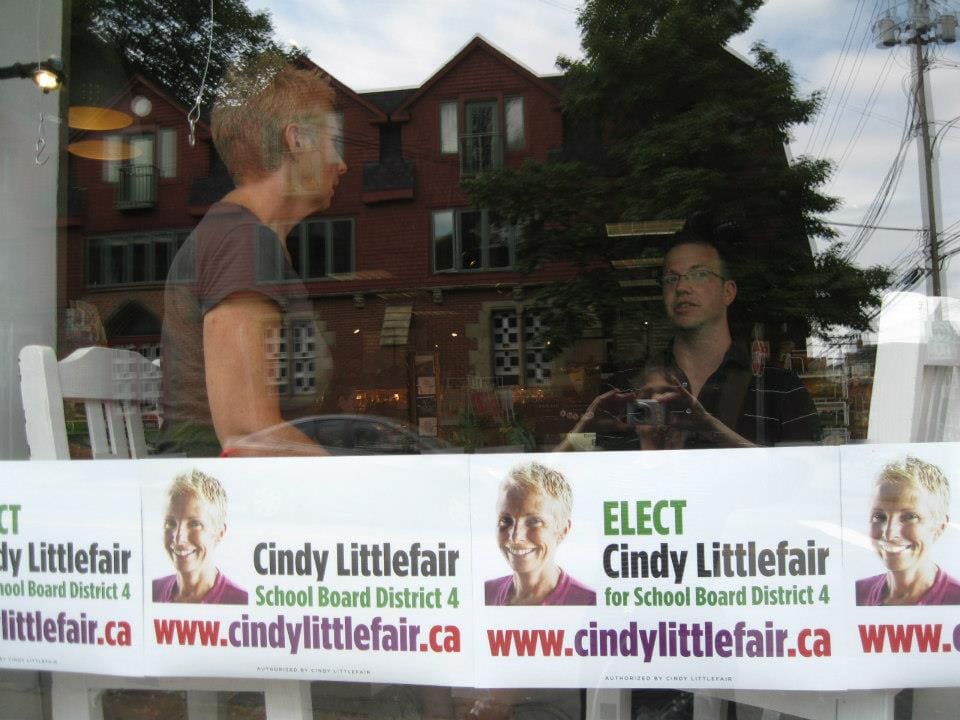Comments offered by Cindy Littlefair, Halifax Regional School Board (HRSB) member for district 4, at the Feb. 21/18 Special Board Meeting on the motion recommending that the Nova Scotia School Board Association be asked to convene a general meeting.
I suppose if I was a good board member, a dutiful board member, I would “go quietly into that good night,” the night described by the newly adopted Glaze recommendations. For that matter, I would also do as required of me by my duly assigned board member role and responsibilities. I would not resist. I would not “rage against the dying of the light.” But light is being lost, arguably important light, and before it dies completely it feels like it is incumbent on board members, not chairs but regular members, to continue to act in the best interests of the public we serve, advising it on the changes to come. Alerting it.

I have been confused, no, torn about how to react as an elected member. I envy the teachers their Nova Scotia Teachers Union, their representation. I envy the public its complete freedom of personal expression. I have struggled with the fact that our own hands are tied. I feel like I have mostly sat quietly by while this thing marches toward its seemingly inevitable conclusion. The only group less enviable than regular board members at the moment is board chairs. With board chairs having been conscripted into the effort to dissolve the very boards they serve they have been placed squarely in opposition, isolated, alone, and in conflict.
We need leadership at this moment. Those of us not conscripted into the dissolution effort want to serve the public to the end. Earn our stipend. Fulfil our duty. What “serving” looks like at this moment in the history of education in this province isn’t clear. Perhaps it’s a matter of shedding light on the perceived implications of the recommendations. Perhaps it’s action. Whatever it is it continues to be about the public we serve. If ever there was a time to represent, it’s now. It’s not the representation described by the org chart and definitions into which we were inducted as elected members but that induction did not anticipate this fate. How were we to behave in the event of elimination? Absent an answer it seems continued representation is how we best serve the interests of the public for the time that remains.
It is incumbent on regular, non-chair members to continue to act as a board, adopting the leadership and guidance already provided by our provincial Association, the NSSBA, and its, our, response to the Glaze report. It is time to participate fully, from one end of the province to the other, with the large chorus of voices already registering their concern. The chairs’ hands are tied, the rest of us find ourselves in a no-mans land, but the NSSBA has paved the way.
What will we say? We’ll talk about the grave concerns we have surrounding the disenfranchising of African and Aboriginal Nova Scotians. We are particularly well-suited to talking about the watering-down of local voice. And we can empathize with teachers who feel they’re being kicked when they’re down. We might also bring attention to the summary elimination of 57 of 104 seats filled by female electeds. And all for questionable gain.
We are reminded that our health was to improve as a result of improvements to the health system. We’re now told that education will improve as a result of improvements to the education system. With the recommendations now being implemented? How? There’s little, if anything, that directly and immediately improves the lot of students. And about the recommendations overall? How many of those were the fruit of the very elected boards those recommendations now eliminate? We’re looking down the barrel at a change that brings no demonstrable improvement and threatens the erosion of existing and emerging strengths.
This ends up being both the first and the last big public issue to confront first-time elected members. It doesn’t come with a room full of concerned parents or a nail-biting decision at night’s end but the stakes are high, higher even than a school or boundary review or spending decisions or teacher discipline, because this time it’s the board’s very existence and its contributions that are at stake. We may not be able to change the course of history but it’s incumbent on us to show up.
This post was originally published on Cindy Littlefair’s website. Republished with Cindy’s kind permission.
If you can, please support the Nova Scotia Advocate so that it can continue to cover issues such as poverty, racism, exclusion, workers’ rights and the environment in Nova Scotia. A paywall is not an option, since it would exclude many readers who don’t have any disposable income at all. We rely entirely on one-time donations and a tiny but mighty group of dedicated monthly sustainers.




Elected School Boards should continue to be an important part of the democratic decision-making process for education throughout the province. Each time government stream-lines governance, citizens are one step further away from participating or even knowing what’s going on. A case in point is the reduction of the number of HRM Councillors- fewer representatives with larger areas to cover are less accessible and less able to pay attention to details.
Limitations/incompetencies of boards (or government) that are often the only news we hear about in the media are part of democracy-the messy parts. They ignore the on-going important work that these bodies can and do accomplish. Failures are reminders that there needs to be over-site of these but also that citizens need to continue to engage rather then abandon them. And keep the focus on what is being done within the school system to increase time on task for students-rather than measure outcomes.
Unfortunately in Nova Scotia government often fails to act in the interests of citizens. There’s so little transparency. No wonder that we’re less engaged. And then there is the complication of not wanting to speak up because of retaliation. Thanks for being brave Cindy in giving your concerns voice. And thank you for persisting! You’re correct, the work you do in important.